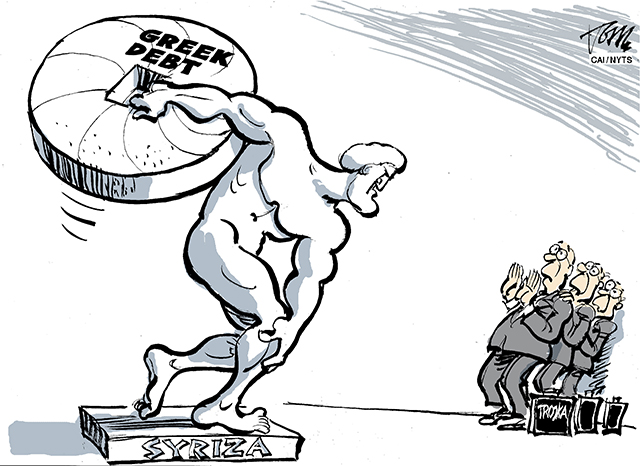
We just had another electoral earthquake in the eurozone: Candidates backed by the anti-austerity party Podemos have won local elections in Madrid and Barcelona. And I hope that the IFKATs – or the “institutions formerly known as the troika” – are paying attention.
The essence of Greece’s situation today is that the parameters of a short-term deal are clear and unavoidable: Greece can’t run a primary budget deficit, because nobody will lend the country money. And it won’t (and basically can’t) run a large primary surplus, simply because no more blood can be squeezed from that stone. So one would think that an agreement for Greece to run a modest primary surplus over the next few years would be easy to reach. That is what will happen, so why not make it official?
But now the International Monetary Fund is playing bad cop, declaring that it cannot release funds until Greece’s Syriza party toes the line on pensions and labor market reform. The latter involves dubious economics – the I.M.F.’s own research doesn’t support enthusiasm for structural reforms, especially of the labor market. The former probably recognizes a real problem – it’s unlikely that Greece will be able to deliver what it has promised its pensioners – but why should this be an issue over and above the general question of the primary surplus?
What I would urge everyone to do is ask what happens if Greece is, in fact, pushed out of the eurozone. (Yes, it’s called “Grexit” – an ugly word, but we’re stuck with it.)
It would surely be ugly in Greece, at least at first. Right now the core euro countries believe that the rest of the eurozone can handle Greece’s exit, which might be true. Bear in mind, however, that the supposed firewall of support from the European Central Bank has never actually been tested. If markets lose faith and the time for E.C.B. purchases of Spanish or Italian bonds arises, will they really happen?
But the bigger question is what transpires a year or two after Grexit, when the real risk to the euro isn’t that Greece fails, but that it succeeds. Suppose that a greatly devalued new drachma brings a flood of British beer drinkers to the Ionian Sea, and Greece starts to recover. This would greatly encourage challengers to austerity and internal devaluation elsewhere.
Just the other day the Very Serious Europeans were hailing Spain as a great success story, a vindication of the whole austerity program. But, evidently, the Spanish people don’t agree. And if the anti-establishment forces have a recovering Greece to point to, the discrediting of the establishment will accelerate.
Trump is silencing political dissent. We appeal for your support.
Progressive nonprofits are the latest target caught in Trump’s crosshairs. With the aim of eliminating political opposition, Trump and his sycophants are working to curb government funding, constrain private foundations, and even cut tax-exempt status from organizations he dislikes.
We’re concerned, because Truthout is not immune to such bad-faith attacks.
We can only resist Trump’s attacks by cultivating a strong base of support. The right-wing mediasphere is funded comfortably by billionaire owners and venture capitalist philanthropists. At Truthout, we have you.
Truthout has launched a fundraiser to raise $50,000 in the next 9 days. Please take a meaningful action in the fight against authoritarianism: make a one-time or monthly donation to Truthout. If you have the means, please dig deep.